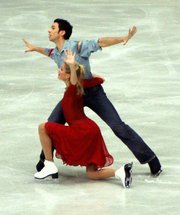 I haven't posted for a while. Apologies for that, but the flu has hit my family pretty hard, and something had to give. So here's a quick post on two of my favorite topics: the practice of law and the Winter Olympics.
I haven't posted for a while. Apologies for that, but the flu has hit my family pretty hard, and something had to give. So here's a quick post on two of my favorite topics: the practice of law and the Winter Olympics.In my opinion, the Winter Olympics are far more fun to watch than the summer ones (curling and ice dancing aside), but that is beside the point. What is on point is that for the life of me I cannot fathom devoting four or more years of my life to pursuing a medal, when one slip can cost you the entire thing. Look at Michelle Kwan. She devoted a decade to pursuit of gold, dominated her sport, and came away without the ultimate prize. I'm not saying it's not a worthwhile pursuit; I'm just saying I don't get it.
Instead, I am much better at working to excel in the classroom and in the practice of law. Why? Because consistent excellency is what is rewarded there, not momentary shine. The practice of law is much more like the pro basketball season than it is like the Olympics. Long seasons filled with individual games that alone do not have a lot of meaning, but added up are terribly important. And a key to doing well in pro basketball (in addition to having natural talent, of course) is to make sure you have the fundamentals covered. No traveling violations. No shot clock violations. Strategic fouling. Inbounding the ball. You can be the best 3 point shooter ever, and if you don't do the basics, then you're toast. Getting back to the Olympics, if practicing law were an olympic sport it would be a marathon, not a sprint. But those are the summer games, which are largely boring in my view.
So in the practice of law, a lot of what you do is like dribbling the ball. You coordinate filings. Depose witnesses. Conduct factfinding teleconferences. Don't miss filing dates. It's not glamorous, but it's a key part of the game. And really, in becoming the expert on a particular deal or case, often you are the only one who can do these things efficiently--so you do them. For example, if a notebook of exhibits needs to be put together, who knows what exhibits are the proper ones? You do. Not your secretary. She might make the copies, but you do the prep work and the final check of the work product--that is, you do the very ordinary, but very crucial prep work.
And here's the real point: if you don't do that kind of thing, you will never get the opportunity to try the really big case or put together the novel corporate deal. You will not be getting the job done for either your client or the partners you work for. You likely will flunk out of practice. I have seen a number of lawyers, very bright people, flunk out of practice because they refused to master fundamentals like these. What a shame.
So for you students, bear this in mind the next time you are reading the "big cases" in your Con Law book. Remember that for every big case, there were thousands of more ordinary cases, with a lot of background work to them. But those cases were important to the clients involved--and after all, the clients are who you are supposed to be serving.



No comments:
Post a Comment